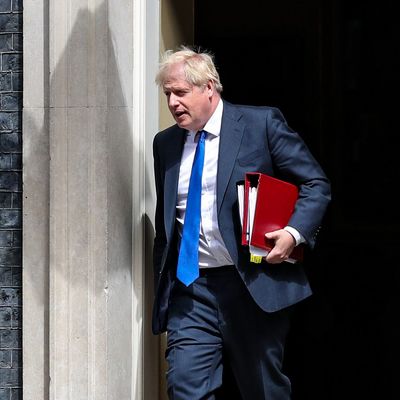
Two of his most important ministers quit within minutes of each other. A prominent political ally has told him it’s time to go. The usually favorable tabloid press is all but abandoning him. The rebellion within his own party, marked by mass resignations, is growing fiercer by the moment.
Prime Minister Boris Johnson has weathered scandal after scandal during his three years at 10 Downing Street, to the point that his indomitability has become something of a trope.
But this time, he faces a near-complete collapse of support from his own party, with no clear path to political survival.
On Wednesday, dozens of officials in Johnson’s government resigned, and several of his cabinet ministers were planning to confront him at 10 Downing Street to tell him that he needs to step down. One of the ministers is Nadhim Zahawi, whom Johnson appointed chancellor of the Exchequer only on Tuesday, after Rishi Sunak’s departure. If the pressure campaign doesn’t work, Tories could call for a no-confidence vote next week, though that would require changing parliamentary rules. And for now, it seems Johnson will not leave of his own accord.
During a shaky appearance before the House of Commons on Wednesday, Johnson tried to focus on other matters, like the war in Ukraine, and said would not call snap elections, as some thought he might. His words did little to allay the critics.
The proximate cause of his latest woes is a previously little-known Tory politician named Chris Pincher. Last week, Pincher was suspended after allegedly groping two men at a private London club. Then it emerged that in 2019, when Johnson had made him a junior minister (Pincher later rose to deputy chief whip), the PM knew of a previous allegation from 2017 yet hired him anyway. After days of dissembling from 10 Downing Street — which has become a very familiar pattern — Johnson admitted his previous knowledge and apologized for hiring Pincher. Shortly after, Sunak and Sajid Javid, the Health secretary, resigned. And on Wednesday, Johnson’s position worsened considerably with a flurry of new departures. Leading Brexiteer Michael Gove, one of Johnson’s senior ministers, told Johnson he should resign. Hours later, Johnson retaliated.
The events of Tuesday and Wednesday felt like the breaking open of a piñata that was already about to burst.
The PM’s onetime Teflon image has been severely tarnished in recent months, in large part due to revelations about his seemingly endless flouting of strict pandemic rules he had imposed himself. After a drawn-out and damaging inquiry — during which Johnson waded into multiple unrelated scandals — the PM faced a no-confidence vote from his party, which he survived but which left him badly wounded. Under current rules, Johnson can’t face another no-confidence vote for a year. But the committee that controls those rules may see a leadership change as early as Monday and may nuke that regulation. A second no-confidence vote would very likely result in Johnson’s ouster.
There is little incentive to keep him on. Johnson’s popularity around the country has plummeted, and he is now seen as a political liability — a stark contrast to his previous reputation as a winner, which he largely earned in a triumphant 2019 campaign. He seems determined to press on and defy the odds one more time, but his exit now seems a matter of when, not if.
Oh, how the mighty have fallen.






























